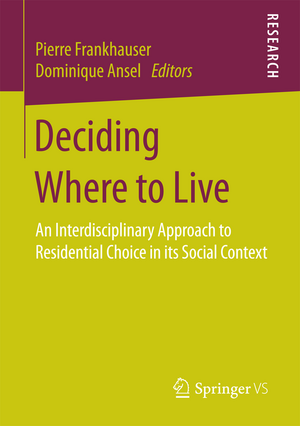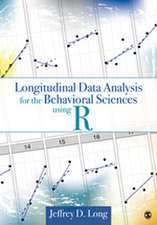Deciding Where to Live: An Interdisciplinary Approach to Residential Choice in its Social Context
Editat de Pierre Frankhauser, Dominique Anselen Limba Engleză Paperback – 22 sep 2016
This book proposes, from a cross-disciplinary perspective, an original reading of current work on residential choice and the decisions associated with it. Geographers, social-psychologists, economists, sociologists, neurologists and linguists have worked together in the context of collective research into evaluation, choice and decision-making in the use of urban and periurban spaces. A synthetic outlook has been constructed from these complimentary scientific references. The book, which is designed as a handbook, also provides the opportunity to set out the different approaches to deal with the models which have been developed in this field.
Preț: 486.98 lei
Nou
Puncte Express: 730
Preț estimativ în valută:
93.18€ • 101.54$ • 78.52£
93.18€ • 101.54$ • 78.52£
Carte tipărită la comandă
Livrare economică 23 aprilie-07 mai
Preluare comenzi: 021 569.72.76
Specificații
ISBN-13: 9783658155414
ISBN-10: 3658155418
Pagini: 324
Ilustrații: XV, 316 p. 21 illus., 1 illus. in color.
Dimensiuni: 148 x 210 x 18 mm
Greutate: 0.4 kg
Ediția:1st ed. 2016
Editura: Springer Fachmedien Wiesbaden
Colecția Springer VS
Locul publicării:Wiesbaden, Germany
ISBN-10: 3658155418
Pagini: 324
Ilustrații: XV, 316 p. 21 illus., 1 illus. in color.
Dimensiuni: 148 x 210 x 18 mm
Greutate: 0.4 kg
Ediția:1st ed. 2016
Editura: Springer Fachmedien Wiesbaden
Colecția Springer VS
Locul publicării:Wiesbaden, Germany
Cuprins
Individuals in Their Spatial and Social Environments.- The Wheres and Hows of Residential Choice.- Socio-Cognitive Accessibility to Places.- Affect, Uncertainty, and Decision-Making.- Neuroscience and Decision-Making.- Spatial Decision-Making.- Collective and Cooperative Behaviour Models.- Observing The Decision-Making Process.- Preferences, Utility, Choice, and Attractiveness.- Determinism, Probability, and Imprecision in Decision-Making.
Notă biografică
Pierre Frankhauser has a doctoral degree in theoretical physics and in geography. He is full professor of geography at the University of Franche-Comté, Besançon.
Dominique Ansel has a doctoral degree in psychology. He is associate professor at the University of Franche-Comté, Besançon.
Dominique Ansel has a doctoral degree in psychology. He is associate professor at the University of Franche-Comté, Besançon.
Textul de pe ultima copertă
This book proposes, from a cross-disciplinary perspective, an original reading of current work on residential choice and the decisions associated with it. Geographers, social-psychologists, economists, sociologists, neurologists and linguists have worked together in the context of collective research into evaluation, choice and decision-making in the use of urban and periurban spaces. A synthetic outlook has been constructed from these complementary scientific references. The book, which is designed as a handbook, also provides the opportunity to set out the different approaches to deal with the models which have been developed in this field.
Contents
•Individuals in Their Spatial and Social Environments
•The Wheres and Hows of Residential Choice
•Socio-Cognitive Accessibility to Places
•Affect, Uncertainty, and Decision-Making
•Neuroscience and Decision-Making
•Spatial Decision-Making
•Collective and Cooperative Behaviour Models
•Observing The Decision-Making Process
•Preferences, Utility, Choice, and Attractiveness
•Determinism, Probability, and Imprecision in Decision-Making
Target Groups
•Lecturers and students of social science, geography and psychology
•Social actors and decision-makers involved in regional development
About the Editors
Pierre Frankhauser has a doctoral degree in theoretical physics and in geography. He is full professor of geography at the University of Franche-Comté, Besançon.
Dominique Ansel has a doctoral degree in psychology. He is associate professor at the University of Franche-Comté, Besançon.
Caracteristici
Interdisciplinary study in social science, geography, psychology, economics, sociology, linguistics, medicine Cross-disciplinary work on residential choice from complementary scientific subject areas Multiscalar and multidimensional approach













